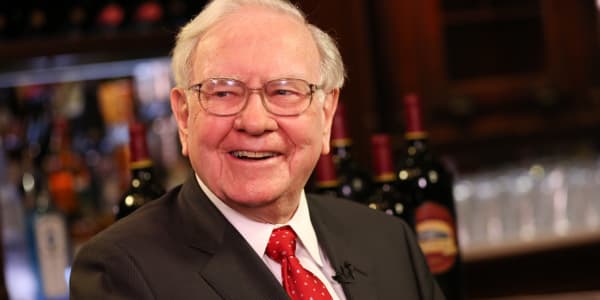The IPO market is painting a cold-blooded picture of the toll this summer's market turmoil has taken on innovation and growth: The number of IPOs this year could drop by as many as 20 below what was expected as recently as last month.
The market is likely to see as few as 180 initial public offerings in the U.S. by the end of the year, down from an estimate of 200 in September and 275 deals last year, said Kathleen Smith, president of Renaissance Capital, a research and investment firm focused on IPOs. If the pace holds, it would represent a 35 percent decline from last year's deal flow.
The toll has been even tougher for technology companies: Only 17 tech companies have gone public this year, Renaissance analyst Nick Einhorn said. Digicel, the cellphone provider serving the Caribbean, withdrew its IPO last week, one of 65 deals canceled this year. That's the most since 2012.
"I don't expect it will get that much busier," said David Menlow, president of the IPO Financial Network, who said a scarcity of deals led to overpricing earlier in 2015 and burned investors who lost money in the aftermarket. "The valuations get too frothy, and the markets step back and say, 'Not me.'''
Read MoreYahoo's 'Mayer' effect on stocks
As a group, the IPO market outperformed the broader market in the first half of the year but is down much more than other stocks in the months since, as turmoil spread from China to spawn a correction in Western markets. And that made it tough for the next group of IPO candidates to sell their deals, whether they are unprofitable tech deals like Pure Storage, whose stock traded down after its IPO last week, or highly profitable consumer companies, like SoulCycle, which is expected to price a deal later this fall.
Results from the week ended Oct. 2 were typical: 11 companies hoped to go public, but only five deals were completed. Those five, on average, commanded prices 27 percent below the midpoint of their pre-deal estimated ranges, Smith said. Even then, they didn't generate the first-day pops investors look for from IPOs, dipping 0.4 percent on average in initial trading. Of the 141 IPOs this year, 38 have had negative debuts.
The long-hyped IPO of Pure Storage fell flat last week. The fast-growing but unprofitable Silicon Valley start-up, which was valued at more than $3 billion by private investors last summer, priced at $17 a share, the midpoint of its pre-deal range, and slumped once it opened. Pure went public last Wednesday and hit a low of $15.50 during trading last Thursday. It finished the week below its IPO price.
"The muppets are not in the market,'' Smith joked, using a slang term for unsophisticated investors who bite on trendy stocks regardless of price. "The dumb money is not here.'' Smith added, "Now there's more investor psychology looking for cash flow. They're less tolerant of risk.''
The average third-quarter IPO fell 19 percent after its initial pop, with 87 percent of companies going public losing ground after the dust cleared, according to Renaissance. Only 14 of 27 third-quarter deals were above the initial IPO price at Sept. 30, Smith said.
Only five IPOs are set to be priced this week, including two closely watched private-equity turnaround deals: Supermarket chain Albertsons and payment processor First Data, weighed down by debt from its 2007 leveraged buyout led by KKR & Co. Both may suffer from skepticism about the debt loads remaining from their deals even after IPOs designed partly to reduce their burden of interest payments.
The muppets are not in the market. The dumb money is not here.Kathleen Smithpresident, Renaissance Capital
At First Data, the largest processor of U.S. e-commerce payments, CEO Frank Bisignano said in an online roadshow that the company is in the midst of a "transformation" — yet revenue in 2014 rose only about 2 percent, and the company posted another 1.6 percent gain in the first half of this year. Industry-wide, U.S. e-commerce sales rose 14 percent from year-ago levels in the second quarter of 2015, according to the U.S. Census Bureau's retail sales report.
Read MoreWhat mutual funds prefer you don't know
First Data will raise nearly $3.7 billion in its IPO but will still have $18.8 billion in outstanding debt after going public, according to its prospectus. That means more work to do in restructuring its finances: The company, which made $1.27 billion before interest, taxes, depreciation and amortization in the first half of the year on $5.57 billion in revenue, posted a net loss of $30 million, thanks to $813 million in interest payments.
The deal could trade down because of the debt load, but new managers are making progress in adding technologies to help small-business customers run functions like scheduling and accounting using First Data's technology, Renaissance analyst Will Preston said. The company's core-business growth would also be stronger, about 5 percent, if the strong dollar were not depressing overseas sales, he estimated.
"Think of it as a 5 percent growth company with some new initiatives that people don't know how they will work,'' Preston said.
Albertsons, a Boise, Idaho-based supermarket chain set to launch its IPO around Oct. 14, also has to convince the market its heavy debt load won't interfere with profit growth. Only 36 private equity–backed deals have been done this year, according to Renaissance.
Albertsons pitch in its roadshow has been focused on improved profit margins at companies it acquires; that its numbers are likely to improve as it integrates Safeway, which it bought in January; and the 71 A&P stores it has agreed to buy.
In the first quarter of its current fiscal year, Albertsons lost $153 million on $27.2 billion of sales. Including Safeway and A&P, it would have had sales of $57.9 billion, adjusted earnings before interest, taxes and noncash charges of $2.5 billion and free cash flow of $1.7 billion for the 12 months ending this June.
Read MoreTapping your home for retirement
But Menlow said the Albertsons deal, at $23 to $26 a share for an equity valuation of $12.4 billion alongside $10.7 billion of post-IPO debt, is still too expensive. Albertsons size and profitability are still less than that of industry rival Kroger, its closest comparable. Linda Killian, a co-manager of , said the Albertsons deal proposes a valuation lower than Kroger's by some metrics but higher than peers such as Delhaize and Koninklijke Ahold N.V., which also own U.S. supermarket chains.
The Safeway acquisition in particular is so new that the market is unlikely to give Albertsons the benefit of the doubt about how soon it can expand margins, KIllian said.
"It's hard to tell if they've improved anything," the IPO ETF manager said. "Same-store sales have improved since 2013, but so has the whole industry. Kroger is a longtime, very experienced operator with a consistent track record of improvement.''
Even smart money has been burned on many recent IPOs, particularly in tech. That made things tougher for Pure Storage and could complicate matters for upcoming tech IPOs such as the payments company Square, which has not yet publicly disclosed its financials, Einhorn said.
"Pure is very negative for high-growth tech IPOs. Public investors are reluctant to pay more than private investors have been.''
The online marketplace Etsy, which went public in April at $16 a share, has seen its stock fall by more than half since its $35.74 peak — and that's before Amazon.com announced on Oct. 8 it is launching its own crafts marketplace for one-of-a-kind goods like those Etsy sells. Etsy shares fell 3 percent last week.
Soul-searching IPOs
It's normal for investors to get more risk-averse about IPOs when broader markets are in turmoil — the IPO market for start-ups shut down almost entirely from the financial crisis in late 2008 until 2011. The question is whether the market's wariness will extend beyond earlier-stage tech and debt-laden companies controlled by private equity firms, to a growing consumer company like SoulCycle, which made $25.3 million last year.
SoulCycle is growing about 50 percent so far in 2015 and converting almost a third of its sales to cash flow even as it invests in the business. The New York exercise-class chain said it wants to expand by 10 to 15 stores per year and is considering selling its program into the home-fitness market.
Yet SoulCycle has drawn some skepticism for its New Age-y prospectus that claims the company is "leading the global trend towards healthy living and a lifelong quest for meaning, wellness and personal growth."
"The growth is definitely good," Einhorn said. "They're hitting the right kind of demographic trend."
But maybe heading out into the wrong market.
—By Tim Mullaney, special to CNBC.com





